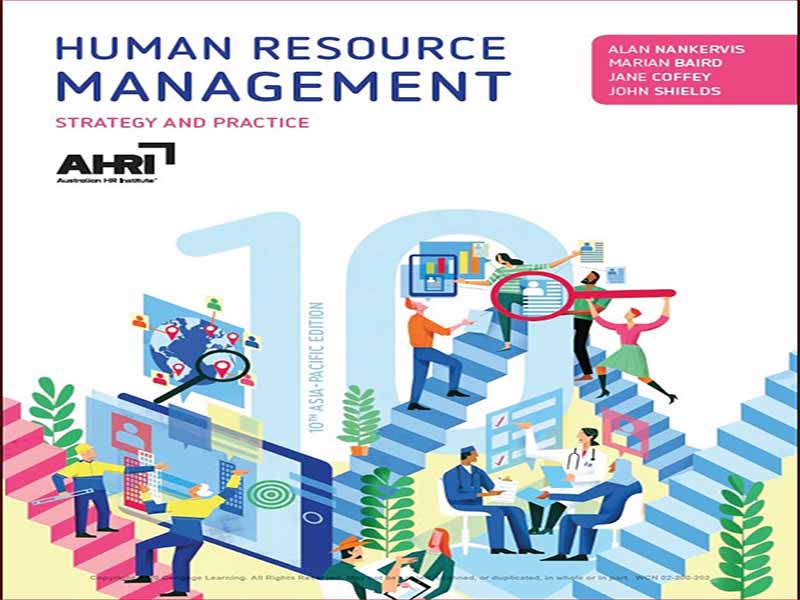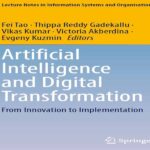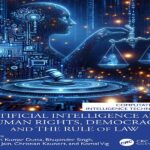- عنوان کتاب: Human Resource Management – Strategy and Practice
- نویسنده: Alan Nankervis
- حوزه: منابع انسانی
- سال انتشار: 2020
- تعداد صفحه: 598
- زبان اصلی: انگلیسی
- نوع فایل: pdf
- حجم فایل: 8.19 مگابایت
با نزدیک شدن به سال 2020، تغییرات عمیق اجتماعی سیاسی، اقتصادی، فنی و محیطی بر دنیای کار تأثیر می گذارد. این تغییرات و چالشهای همراه بر نقشها، مهارتها و اهمیت مدیریت منابع انسانی (HRM) در تئوری و عمل تأثیر خواهد گذاشت. شاید مهم ترین کاتالیزور در تغییر سازمان های حال و آینده، محیط های کاری، شرایط استخدام، مشاغل و مهارت های موردنیاز کارکنان، تأثیر انقلاب صنعتی چهارم (4IR، «صنعت 4.0» یا به سادگی «4.0») باشد. این «انقلاب» فناوری که توسط چارلز شواب، بنیانگذار مجمع جهانی اقتصاد ابداع شده است، تحول دیجیتالی در جامعه و تجارت است که شامل رابط بین فناوریها در رشتههای فیزیکی، دیجیتال و بیولوژیکی است. فناوری های نوظهور – مانند هوش مصنوعی، رباتیک، اینترنت اشیاء، وسایل نقلیه خودران، چاپ سه بعدی، نانوتکنولوژی، بیوتکنولوژی، علم مواد، ذخیره انرژی و محاسبات کوانتومی – تنها نوک این کوه یخ فناوری را نشان می دهد. تغییرات قابل توجهی در محل کار و پتانسیل جایگزینی مشاغل کم مهارت و متوسط با روبات ها پیش بینی می شود. این احتمال وجود دارد که همه صنایع و بیشتر مشاغل توسط 4IR تغییر شکل دهند. 1 برخی از ناظران پیشنهاد می کنند مشاغلی که کمترین تأثیر را از این پیشرفت های فناوری می بینند مشاغل خلاق، انسان محوری و مشاغل ماهر هستند. 2 ترکیب این تغییرات عمده فناوری عدم قطعیت های سیاسی و اقتصادی، و تحولات جمعیتی و اجتماعی-فرهنگی گسترده، از جمله پیری جمعیت و نیروی کار در اکثر کشورهای توسعه یافته و بسیاری از کشورهای در حال ظهور. این با بازارهای کار جوان در کشورهایی مانند اندونزی و هند در تضاد است. نسلهای جوانتر کارگران دارای سبک زندگی و نگرشهای خاصی نسبت به شغل و حرفه خود هستند و در کنار کارمندان مسنتر که انگیزههای متفاوت و دانش و تجربه کاری قابل توجهی دارند، کار میکنند. اقتصاد گیگ و کار مبتنی بر پروژه یا قرارداد، مدلهای شغلی سنتی را به چالش کشیده است و فرصتهای شغلی جهانی که نیازمند دانش، مهارتها و قابلیتهای چندفرهنگی است نیز چالشهای مهمی را برای سازمانها، مدیران، اتحادیهها و بهویژه متخصصان منابع انسانی ایجاد کرده است. تغییرات قانونی با هدف تضمین عدالت، تشویق تنوع و تقویت حاکمیت شرکتی در بسیاری از کشورها به تصویب رسیده است که پیامدهای گسترده ای برای همه سازمان ها، متخصصان منابع انسانی و کارکنان دارد. به عنوان نمونه، کمیسیون حقوق بشر سازمان ملل متحد و یونیسف در سالهای اخیر در منع بردهداری کودکان و کار جنسی، افزایش حقوق کارگران زن و تلاش (اغلب با موفقیت محدود) برای اعمال حقوق و شرایط شغلی در منطقهای فعالتر بودهاند. کارگران مهاجر در سطح جهانی، نوسانات محیط های سیاسی و اقتصادی، سازمان ها را در سراسر جهان با تهدیدها و فرصت های جدید و غیرمنتظره مواجه می کند. اینها با تحولات متنوعی مانند انتخاب رئیس جمهور دونالد ترامپ در ایالات متحده و چالش های ایجاد شده توسط کره شمالی نشان داده شده است. خروج اعتراض آمیز بریتانیا از اتحادیه اروپا پس از همه پرسی برگزیت؛ تشکیل جامعه اقتصادی آسه آن (AEC)؛ تداوم ظهور چین و هند؛ تغییرات مکرر رهبری در استرالیا و جاهای دیگر و ارزها و بازارهای سهام دائماً در نوسان است. اگرچه پیشبینی دشوار است، اما نشانههایی وجود دارد که نشان میدهد نظریههای مدیریت منابع انسانی باید ابعاد محیطی، مسئولیت اجتماعی و اخلاقی قویتری (“HRM سبز”، “HRM پایدار” و “HRM مسئولیتپذیر”) را به همراه داشته باشند، زیرا جوامع و کارگران از سازمانها میخواهند که واکنش بیشتری نشان دهند. استراتژیک برای این چالش های جهانی. در یک «جنگ» فزاینده برای استعدادها، سازمانهایی که در پاسخگویی ناکام میمانند، رقابت را دشوار مییابند زیرا برندسازی کارفرما در این ابعاد برای کارگران جوانتر ضروریتر میشود. در بسیاری از سازمان ها، متخصصان مدیریت منابع انسانی کاتالیزور چنین چالش هایی هستند (یا خواهند شد). علاوه بر این، با توجه به تغییرات چشمگیر در مشاغل، مهارت ها و کل محیط های کاری مرتبط با Industry 4.0، متخصصان مدیریت منابع انسانی باید به شدت بر برنامه ریزی منابع انسانی فعال، پویش محیطی جهانی و محلی تمرکز کنند، و بسیاری از عملکردهای سنتی خود را واگذار کنند (جذب و حفظ، یادگیری و توسعه، مدیریت عملکرد و پاداش) به مدیران خط و/یا برون سپاری به ارائه دهندگان خدمات خارجی و استفاده از هوش مصنوعی یا فناوری های روباتیک برای تقویت آنها. استفاده روزافزون از کلان داده ها و سیستم های مدیریت اطلاعات منابع انسانی پیچیده تر (HRIMS) برای این اهداف و همچنین پاسخگویی قوی تر برای استراتژی ها، فرآیندها و نتایج آنها اجباری خواهد شد.
As we approach 2020, profound sociopolitical, economic, technical and environmental changes are affecting the world of work. These changes and the accompanying challenges will impact on the roles, skills and significance of human resource management (HRM) in theory and in practice. Perhaps the most important catalyst in changing present and future organisations, workplaces, employment conditions, jobs and employees’ skills requirements will be the impact of the socalled Fourth Industrial Revolution (4IR, ‘Industry 4.0’, or simply ‘4.0’). Coined by Charles Schwab, founder of the World Economic Forum, this technological ‘revolution’ is the digital transformation in society and business which involves an interface between technologies in the physical, digital and biological disciplines. Emerging technology – such as artificial intelligence, robotics, the Internet of Things, autonomous vehicles, 3-D printing, nanotechnology, biotechnology, materials science, energy storage and quantum computing – represent just the tip of this technology iceberg. Significant workplace changes and the potential to replace lowand medium-skilled jobs with robots are anticipated. It is likely that all industries and most occupations will be transformed by the 4IR.1 Some observers suggest the occupations that will be least affected by these technological developments are those in creative work, humancentred and skilled trades jobs.2 Compounding these major technological changes are political and economic uncertainties, and broad demographic and sociocultural developments, including the ageing of the population and workforces in most developed and many emerging countries. This is contrasted with youthful labour markets in countries such as Indonesia and India. Younger generations of workers possess particular lifestyles and attitudes towards their jobs and careers, working alongside older employees who have different motivations and considerable work knowledge and experience. The gig economy and project-based or contract work have challenged traditional employment models, and global career opportunities requiring multicultural knowledge, skills and capabilities have also provided significant challenges for organisations, managers, unions and, in particular, human resource professionals. Legislative changes aimed at ensuring equity, encouraging diversity and strengthening corporate governance have been enacted in many countries, with far-reaching consequences for all organisations, HR professionals and employees. As examples, the UN Human Rights Commission and UNICEF have been more active in recent years in proscribing child slavery and sex work, enhancing female workers’ rights and attempting (often with only limited success) to enforce the rights and employment conditions of cross-regional migrant workers. At the global level, the volatility of political and economic environments provides organisations across the world with new and unexpected threats and opportunities. These are illustrated by such diverse developments as the election of President Donald Trump in the United States and the challenges posed by North Korea; the contested withdrawal of the United Kingdom from the European Union following the Brexit referendum; the formation of the ASEAN Economic Community (AEC); the continuing rise of China and India; frequent leadership changes in Australia and elsewhere, and constantly fluctuating currencies and stock markets. While it is difficult to predict, there are indications that HRM theories will need to incorporate stronger environmental, social responsibility and ethical dimensions (‘green HRM’, ‘sustainable HRM’ and ‘responsible HRM’) as communities and workers demand that organisations respond more strategically to these global challenges. In an increasing ‘war’ for talent, organisations that fail to respond will find it difficult to compete as employer branding in these dimensions becomes more imperative for choosy younger workers. In many organisations, HRM professionals are (or will become) the catalysts for such challenges. In addition, given the monumental changes to jobs, skills and entire workplaces associated with Industry 4.0, HRM professionals will need to focus more intensively on proactive human resource planning, global and local environmental scanning, devolving many of their traditional functions (attraction and retention, learning and development, performance and rewards management) to line managers and/or outsourcing to external service providers, and using artificial intelligence or robotic technologies to augment them. The increasing use of big data and more sophisticated human resource information management systems (HRIMS) will become mandatory for these purposes, as well as stronger accountability for their strategies, processes and outcomes.
این کتاب را میتوانید از لینک زیر بصورت رایگان دانلود کنید:





































نظرات کاربران